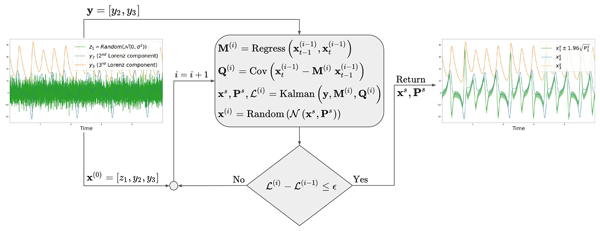Discovering latent variables in incomplete dynamical systems
Conference
65th ISI World Statistics Congress
Format: IPS Abstract - WSC 2025
Keywords: data-driven, time-series
Abstract
The state of the atmosphere, or of the ocean, cannot be exhaustively observed. Crucial parts might remain out of reach of proper monitoring. Also, defining the exact set of equations driving the atmosphere and ocean is virtually impossible because of their complexity. The goal of this work is two-fold: (i) identify a statistical dynamical model and (ii) obtain precise and reliable predictions of a partially observed dynamical system, without knowing the model equations. In this data-driven context, the presentation firstly focuses on the Lorenz-63 system, where only one or two components are observed and access to the equations is not allowed. To account for those strong constraints, a combination of machine learning and data assimilation techniques is proposed. The key methodological aspects are the following: the introduction of latent variables, a linear approximation of the dynamics and a database that is updated iteratively, maximizing the likelihood. We find that the latent variables inferred by the procedure are related to the successive derivatives of the observed components of the dynamical system. The method is also able to reconstruct accurately the local dynamics of the partially observed system. The presentation secondly focuses on real climate data. The assumption made is that time series of important climate indices exist, but some of them are not available. The proposed methodology is able to detect the missing information and use it to build a simplified statistical model to make some probabilistic forecasts.
Figures/Tables
abstract_NPG

